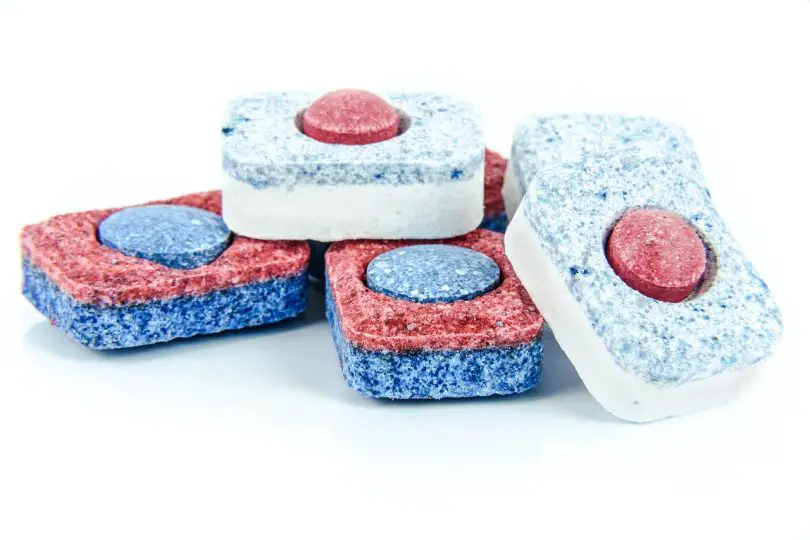Did you know that the average household uses around 40 pounds of dish soap each year? That’s a lot of plastic bottles and potentially harmful chemicals going down the drain.
But what if there was a way to make your own dish soap, using natural ingredients that are better for your health and the environment?
In this discussion, we will explore the world of handmade dish soap recipes, giving you the knowledge and inspiration to create your own eco-friendly and effective cleaning solution.
So, if you’re ready to ditch the store-bought options and take control of what goes into your dish soap, keep reading to discover the secrets of homemade dish soap recipes.
Why Choose Handmade Dish Soap?
Why should you choose handmade dish soap over store-bought options? Well, there are several compelling reasons to consider.
Firstly, handmade dish soap is often made with natural ingredients, which means it’s free from harmful chemicals and toxins. When you use store-bought dish soap, you expose yourself and your family to potentially harmful substances that can linger on your dishes and seep into your food. By choosing handmade dish soap, you can have peace of mind knowing that you’re using a product that’s safe for your health and the environment.
Secondly, handmade dish soap is often more effective at cutting through grease and grime. Many store-bought options contain fillers and additives that can dilute the cleaning power of the soap. Handmade dish soap recipes, on the other hand, often use concentrated ingredients that are specifically chosen for their cleaning abilities. This means that you can get your dishes sparkling clean with less soap and effort.
Lastly, choosing handmade dish soap allows you to support small businesses and artisans. When you purchase handmade products, you’re directly supporting individuals who put their time, passion, and expertise into creating high-quality products. By choosing handmade dish soap, you aren’t only benefiting yourself but also contributing to a sustainable and ethical economy.
Essential Ingredients for Homemade Dish Soap
To create homemade dish soap, you’ll need a few essential ingredients. These ingredients are readily available and can be easily found in most grocery stores or online.
The first ingredient you’ll need is a liquid soap base. This can be a castile soap, which is made from vegetable oils, or a dishwashing liquid that’s free from harsh chemicals. The liquid soap base will provide the cleaning power for your homemade dish soap.
Next, you’ll need an essential oil for fragrance. This is optional, but adding a few drops of essential oil can give your dish soap a pleasant scent. Some popular choices for essential oils include lemon, lavender, and peppermint.
Another essential ingredient is a natural thickening agent, such as salt or xanthan gum. This will help give your dish soap a thicker consistency and make it easier to use.
Lastly, you’ll need water to dilute the ingredients and create the desired consistency for your dish soap.
Basic Recipe for Homemade Dish Soap
Now that you have the essential ingredients for homemade dish soap, let’s dive into the basic recipe to make your own.
Making your own dish soap isn’t only cost-effective but also environmentally friendly. To start, you’ll need 1 cup of liquid castile soap, which serves as the base for your dish soap. Castile soap is a gentle and natural cleanser that’s safe for your dishes and the environment.
Next, add 1 tablespoon of distilled white vinegar. Vinegar helps to cut through grease and leaves your dishes sparkling clean. Additionally, vinegar acts as a natural disinfectant, killing bacteria and germs.
To enhance the cleaning power of your dish soap, add 1 tablespoon of baking soda. Baking soda helps to remove stubborn stains and odors from your dishes.
Finally, mix in 10 drops of your favorite essential oil for a pleasant scent. Essential oils such as lemon, lavender, or peppermint can add a refreshing aroma to your homemade dish soap.
Once all the ingredients are combined, pour your homemade dish soap into a reusable bottle and it’s ready to use.
With this basic recipe, you can now enjoy washing your dishes with a homemade, eco-friendly dish soap.
Adding Scent and Essential Oils to Your Dish Soap
Enhance the scent and cleaning experience of your dish soap by adding your favorite essential oils.
Adding essential oils not only adds a pleasant fragrance to your dish soap, but it can also provide additional benefits. Certain essential oils, such as lemon or orange, have natural antibacterial properties that can help kill germs and bacteria on your dishes. Other essential oils, like lavender or eucalyptus, can help create a calming and relaxing atmosphere while you do your dishes.
To add essential oils to your dish soap, simply mix a few drops of your chosen oil into the soap mixture before it sets. Be sure to choose high-quality, pure essential oils to ensure that you’re getting the full benefits and fragrance.
Experiment with different combinations of essential oils to create your own signature scent for your dish soap. Remember, a little goes a long way with essential oils, so start with just a few drops and adjust according to your preference.
Enjoy the aromatic experience as you wash your dishes, and revel in the fresh and clean scent that lingers afterwards.
Natural Alternatives for Stubborn Grease and Stains
For a more effective solution to stubborn grease and stains, try using natural alternatives.
When it comes to tackling tough grease, lemon juice is your best friend. Its natural acidity helps break down stubborn grease and leaves your dishes sparkling clean. Simply squeeze some fresh lemon juice onto the greasy area, let it sit for a few minutes, and then scrub away with a sponge or brush.
Another effective natural alternative is white vinegar. Its acidic properties make it a great grease and stain remover. Mix equal parts white vinegar and water and use it to soak your dishes or as a spray for countertops and stove tops.
Baking soda is also a powerful and versatile natural cleaner. It acts as a gentle abrasive that can help remove stubborn grease and stains. Sprinkle some baking soda onto a damp sponge or cloth and scrub away. For extra stubborn stains, make a paste by mixing baking soda with a little water and apply it directly to the stain.
With these natural alternatives, you can say goodbye to stubborn grease and stains without the use of harsh chemicals.
Tips for Storing and Using Handmade Dish Soap
To ensure the longevity and effectiveness of your handmade dish soap, it’s important to follow these tips for storing and using it.
– Store your handmade dish soap in a cool, dry place. Exposure to heat and moisture can cause the soap to break down and lose its effectiveness.
– Keep your dish soap in a sealed container to prevent any contamination or evaporation.
– If you have made a large batch of dish soap, consider dividing it into smaller containers to maintain its freshness.
When using your handmade dish soap, remember that a little goes a long way.
– You don’t need to use a large amount of soap to get your dishes clean. Start with a small amount and add more if necessary.
– This not only helps to conserve your soap but also prevents excessive sudsing.
Additionally, avoid using your handmade dish soap on delicate or porous materials such as wood or cast iron. The soap may strip away the natural oils or cause damage.
– Instead, opt for a gentle, specialized cleaner for these items.
Eco-Friendly Packaging Options for Your Homemade Dish Soap
Consider sustainable packaging options for your homemade dish soap to reduce your environmental impact.
When it comes to packaging your homemade dish soap, there are several eco-friendly options to choose from.
One option is to use glass bottles or jars. Glass is a recyclable material that can be reused multiple times without losing its quality. You can easily find glass bottles with pumps or spray nozzles that are perfect for storing and dispensing your homemade dish soap.
Another option is to use stainless steel containers. Stainless steel is durable, long-lasting, and also recyclable. You can find stainless steel containers in various sizes and shapes, making it easy to find one that suits your needs.
Additionally, you can consider using refillable containers made from recycled materials. These containers are designed to be reused and filled up with your homemade dish soap.







